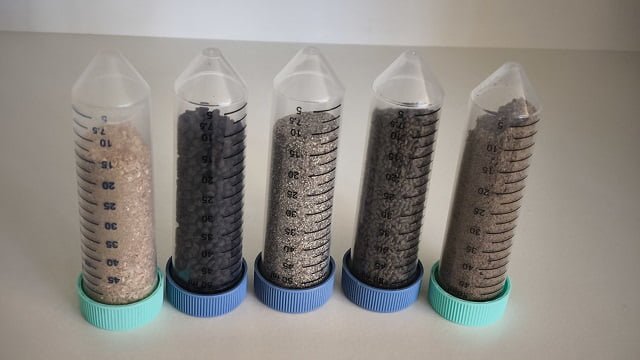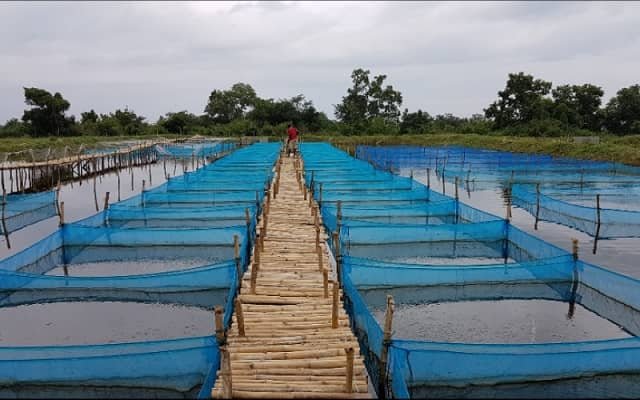
Disease outbreaks and inefficient growth can significantly affect profitability and sustainability in the aquaculture industry. This is where a natural compound called β-glucan emerges as a potential game-changer.
A scientific review conducted by researchers from Chiang Mai University (Thailand), University of South Bohemia in Ceske Budejovice (Czech Republic), Vietnam National University of Agriculture, Gorgan University of Agricultural Sciences and Natural Resources (Iran), Arctic University of Norway, and Kafrelsheikh University (Egypt), published in the prestigious scientific journal Reviews in Aquaculture, investigated the impact of adding β-glucan to the diets of various aquaculture animals. The analysis, covering 82 studies published between 1996 and 2024, revealed significant positive effects on various aspects of fish health.
β-Glucans: A Natural Defense Boost
β-glucans, a group of natural polysaccharides found in fungi, bacteria, and cereals, are emerging as potential prebiotics in aquaculture. These versatile molecules offer a variety of benefits depending on their source. In aquaculture, β-glucans are added to fish feed to boost immunity, disease resistance, and growth.
Benefits of β-glucans:
- Improved immunity: β-glucans stimulate immune cells, strengthening the fish’s natural defense against infections.
- Disease resistance: Studies suggest that β-glucans can protect against parasites, viruses, and bacterial infections.
- Enhanced gut health: β-glucans promote beneficial gut bacteria, improve digestion, and reduce harmful gut metabolites.
- Multiple modes of action: β-glucans can act through various mechanisms, including stimulating immune responses, improving water quality, and aiding digestion.
Optimizing β-glucan Usage
The effectiveness of β-glucans can vary depending on factors such as fish species, breeding conditions, consumption methods, and dosage. While research seems promising, there is conflicting information. To obtain a clearer picture, scientists conducted a systematic review and meta-analysis to investigate the overall impact of β-glucans on the health of fish and shellfish.
β-Glucan: Enhancing Growth and Survival
The study found that the inclusion of β-glucan in fish diets led to significant improvements in several key health parameters:
- Improved growth: Fish fed with β-glucan exhibited a faster specific growth rate (SGR) compared to those on a standard diet.
- Improved feed efficiency: Fish utilized their feed more efficiently, resulting in a better feed conversion ratio (FCR). This translates to less feed waste and a more sustainable farming practice.
- Reduced mortality: When exposed to pathogens, fish supplemented with β-glucan showed a lower mortality rate, highlighting its potential role in disease prevention.
- Optimal duration: A shorter feeding period (around 3 to 8 weeks) could be sufficient to reap the optimal immune response benefits of β-glucan. A longer duration might lead to a phenomenon called “immune fatigue.”
- Trophic level matters: Fish occupying higher positions in the food chain (trophic level) tended to show a weaker immune response to β-glucan supplementation, possibly due to differences in gut length and absorption efficiency.
Strengthening the Immune System
β-glucan proved to be a potent immune booster. Fish fed β-glucan diets showed a significant increase in several innate immune parameters, including:
- Lysozyme and phagocytic activity: These are crucial components of the fish’s first line of defense against pathogens.
- NBT (Nitro Blue Tetrazolium) reduction: This test measures the activity of phagocytic cells that engulf and destroy invading microbes.
- ACH50 (Alternative Complement Activity): This parameter reflects the efficiency of the complement system, a critical part of the immune response.
- IgM levels: This is a key type of antibody involved in the early stages of immune defense.
Freshwater Fish Benefit More
Interestingly, the study revealed a variation in the efficacy of β-glucan depending on fish species. Freshwater fish showed a more pronounced response to β-glucan supplementation compared to their marine counterparts. This suggests a possible need for further research on the specific factors influencing β-glucan absorption in different types of fish.
While the findings are promising, the study acknowledges some limitations. The wide diversity of fish species studied and potential publication bias contribute to some degree of data variation. Additionally, well-designed long-term trials are needed to fully validate these observations.
Stay Always Informed
Join our communities to instantly receive the most important news, reports, and analysis from the aquaculture industry.
Conclusion
The research suggests that β-glucan has immense potential as a natural and sustainable feed additive for aquaculture. By promoting growth, improving feed efficiency, and strengthening the immune system, β-glucan can contribute to healthier fish populations and a stronger aquaculture industry.
The study was partially funded by Chiang Mai University; while open access was facilitated by Jihoceska Univerzita v Ceskych Budejovicich.
Contact
Mahmoud A. O. Dawood
Department of Animal Production, Faculty of Agriculture, Kafrelsheikh University
Kafr El-Sheikh 33516, Egypt.
Email: mahmouddawood55@gmail.com; mahmoud.dawood@agr.kfs.edu.eg
Reference (open access)
Doan, H. V., Ahmed Sumon, M. A., Tran, H. Q., Le, C. X., Mohammady, E. Y., El-Haroun, E. R., Hoseinifar, S. H., Ringo, E., Stejskal, V., & O. Dawood, M. A. Role of β-glucan on finfish and shellfish health and well-being: A systematic review and meta-analysis. Reviews in Aquaculture. https://doi.org/10.1111/raq.12944
Editor at the digital magazine AquaHoy. He holds a degree in Aquaculture Biology from the National University of Santa (UNS) and a Master’s degree in Science and Innovation Management from the Polytechnic University of Valencia, with postgraduate diplomas in Business Innovation and Innovation Management. He possesses extensive experience in the aquaculture and fisheries sector, having led the Fisheries Innovation Unit of the National Program for Innovation in Fisheries and Aquaculture (PNIPA). He has served as a senior consultant in technology watch, an innovation project formulator and advisor, and a lecturer at UNS. He is a member of the Peruvian College of Biologists and was recognized by the World Aquaculture Society (WAS) in 2016 for his contribution to aquaculture.







